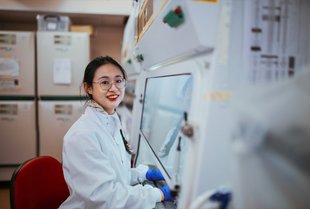Luyao Wang

Postdoctoral Research Assistant in Translational Cancer Immunology
Meet Luyao Wang...
Luyao Wang is a Postdoctoral Research Assistant in Translational Cancer Immunology at the University of Oxford. Here she tells us about her work on ovarian cancer treatment using adoptive T cell therapy.
What inspired you to be a scientist?
When I was young, I have experienced the loss of family members. Both of my grandparents died of cancer, I really loved them, but we can’t company each other anymore because of cancer. Since then, a seed to be a scientist was planted in my mind. I want to be a cancer scientist to help people to have a happier time with family. Now the dream comes true, as a cancer researcher, I feel motivated every day by the fact the work I am doing in the laboratory has the potential to improve the lives of cancer patients.
What projects are you working on that are funded by Ovarian Cancer Action?
Ovarian cancer is one of the main causes of death in women worldwide, despite new targeted therapies and immunotherapies, many patients with advanced-stage cancers still die, owing to metastatic disease. Adoptive T-cell therapy, involving the autologous or allogeneic transplant of tumour-infiltrating lymphocytes or genetically modified T cells expressing novel T-cell receptors or chimeric antigen receptors, has shown promise in the treatment of cancer patients. My ongoing work focuses on establishing a translation-ready therapeutic platform for treating ovarian cancer patients using adoptive T cell therapy.
What is the most exciting part of your job?
The most exciting part of my job is the process of exploration, the findings could be interesting, expected, or unexpected, meanwhile, I will grab some new skills or knowledge during this process. The other most exciting part is to be able to collaborate with many other great scientists.
What is the most challenge part of your job?
The most challenging part of this job is never knowing whether what you’re doing will work and you may hit a dead end in the lab, but still need to continue in the next day. It challenges your mindset and fortitude.
All year round our scientists at the Ovarian Cancer Research Centre, The University of Oxford and beyond are working to find the next breakthrough in ovarian cancer research. Your donation will support the work they do each and every day.